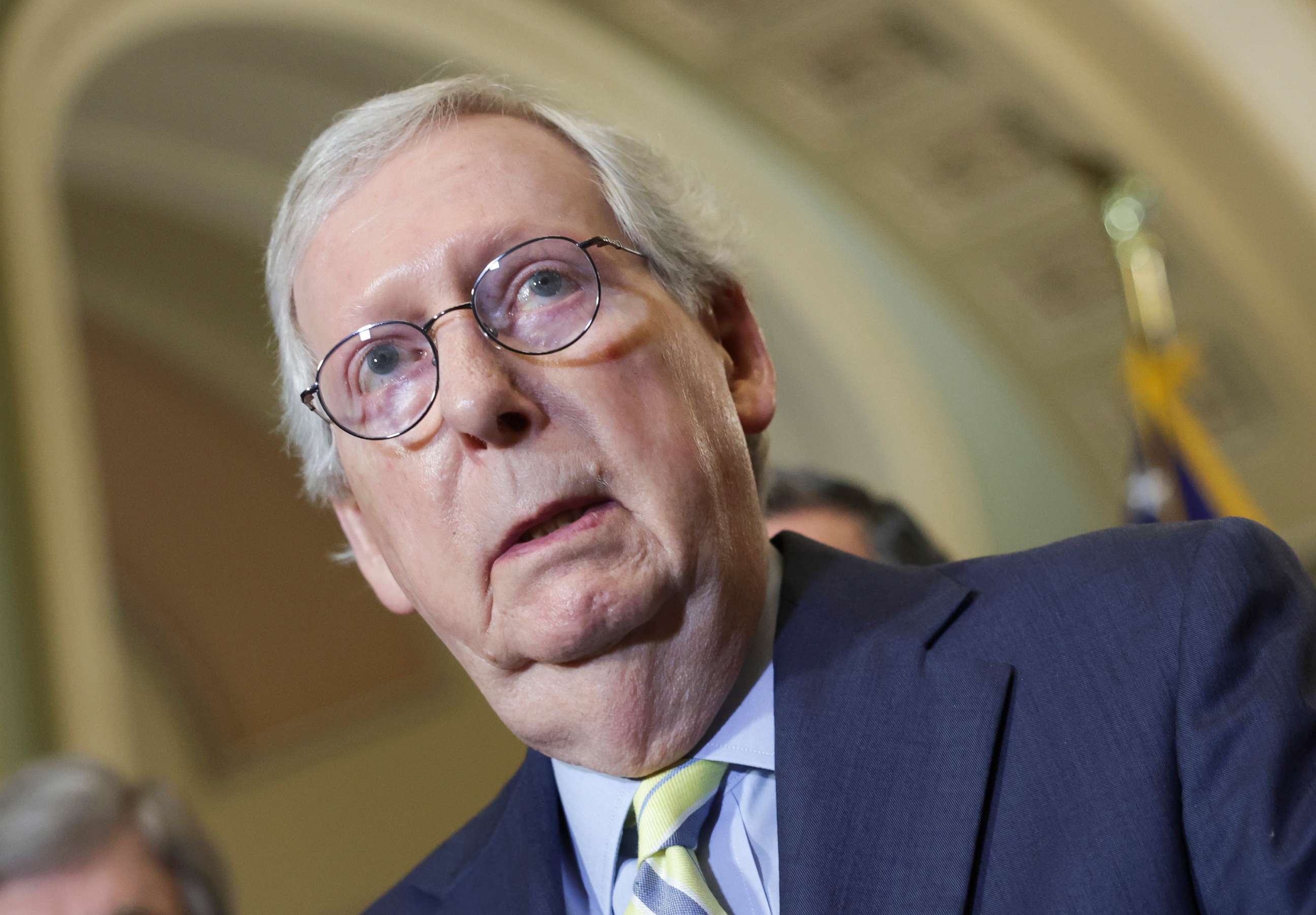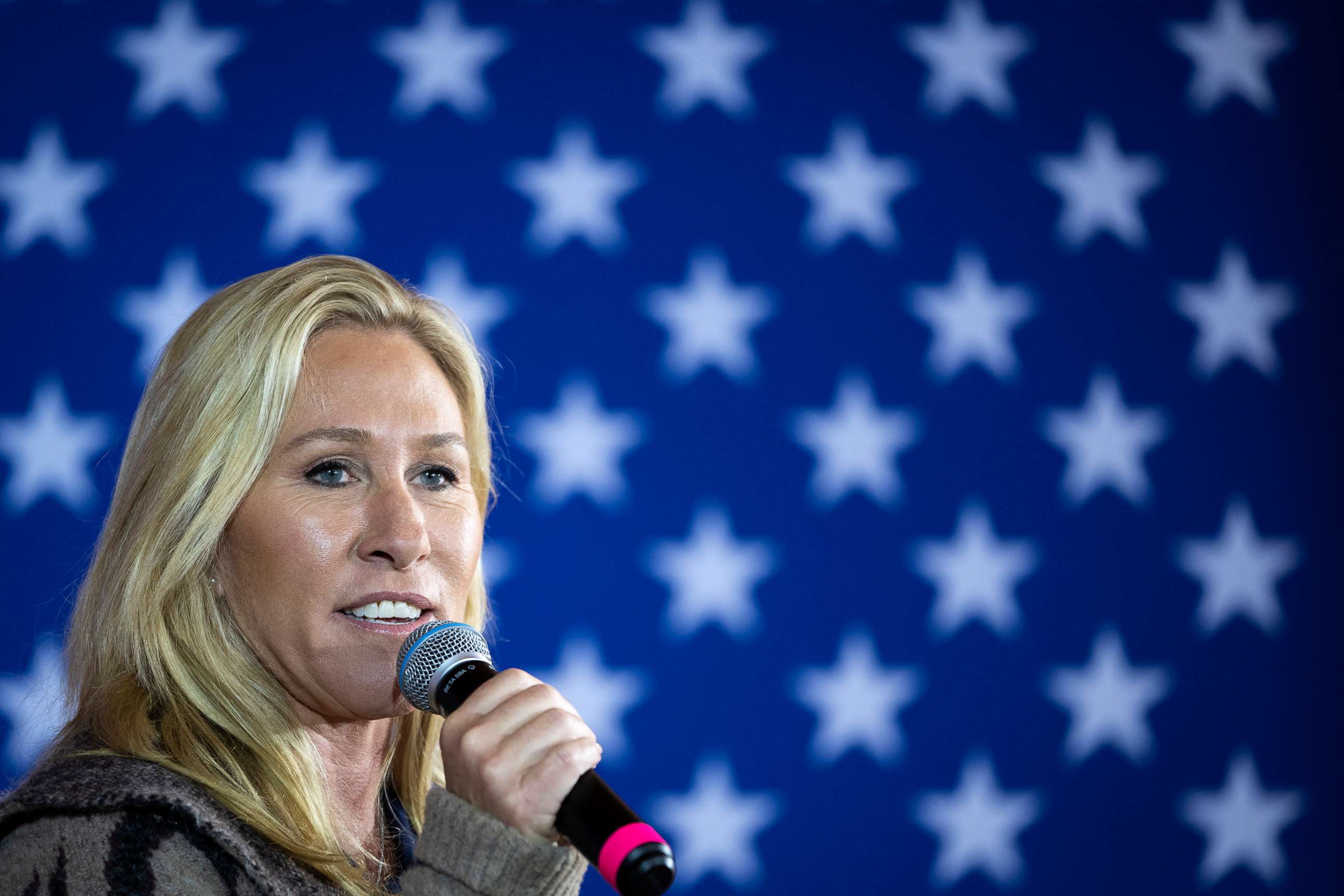GOP pushback builds against Trump primary picks: The Note
Mentions of Mehmet Oz’s name drew boos at Trump's Pennsylvania rally.
The TAKE with Rick Klein
Former President Donald Trump won the first round in the primary season endorsement battle last week, with J.D. Vance's triumph in the GOP Senate primary in Ohio.
It only gets harder from here.
That fact landed directly in Trump's face Friday night when mentions of Dr. Mehmet Oz's name drew boos at the former president's Pennsylvania rally. Some attendees even turned their backs when Oz himself -- Trump's endorsed pick in the next big Senate race -- spoke to the crowd, as ABC News' Lalee Ibssa reported.

Trump used a chunk of time to attack Oz's main GOP rival, David McCormick, as "not MAGA" and the candidate of "the Washington establishment," linking a man who was a former top Trump aide to Senate Minority Leader Mitch McConnell and Rep. Liz Cheney, R-Wyo.
For his part, McCormick hustled up a new ad questioning Oz's stance on abortion rights and suggesting Trump chose the wrong candidate in the race, as Axios' Mike Allen first reported. McCormick is relying on help from Sen. Ted Cruz, R-Texas, and former Trump Secretary of State Mike Pompeo ahead of the May 17 primary.
This coming Tuesday will bring judgments on high-profile Trump endorsements in deep-red West Virginia and Nebraska. Trump's pick for governor of Nebraska, Charles Herbster, is facing groping allegations from two Republican women; Herbster, a high-profile Trump donor, has dismissed the accusations as political smears.
That race remains up for grabs in a splintered field. But even if Herbster and Oz pull out wins, Trump's hope of triumphing against incumbent governors appears to be fading in states including Georgia and Idaho.
Speaking on Oz's behalf Friday, the former president touted the success of his candidate's television show and stated what, if he wins, could go down as the main reason why: "Very importantly, he's supported by somebody known as me."
That does remain important. But even as Republican voters overwhelmingly maintain loyalty to Trump, taking his word up and down the ballot is another story entirely.
The RUNDOWN with Averi Harper
As Republican Senate leadership raises the idea of a national abortion ban, Democratic lawmakers insist reproductive rights will drive voters to the polls in support of their candidates.
In an interview with USA Today on the leaked draft of the Supreme Court decision that would overturn the landmark 1973 decision in Roe v. Wade legalizing abortion nationwide, Senate Minority Leader Mitch McConnell, R-Ky., called a national abortion ban "possible."
"If the leaked opinion became the final opinion, legislative bodies -- not only at the state level but at the federal level -- certainly could legislate in that area," McConnell said.

Even without a national ban, 26 states are likely to impose abortion bans if Roe is overturned, including 13 with "trigger laws" tied to the decision, according to an analysis by reproductive health research group the Guttmacher Institute.
Senate Majority Leader Chuck Schumer, D-N.Y., is slated to bring a vote this week on legislation that would codify abortion rights, but it doesn't have the necessary 60 votes and is expected to fail. Sen. Amy Klobuchar, D-Minn., believes the next line of defense is this fall's midterm elections.
"We march straight to the ballot box, and the women of this country and the men who stand with them will vote like they've never voted before," Klobuchar told ABC's "This Week" co-anchor Martha Raddatz on Sunday.
What remains to be seen is if reproductive rights will get Democratic voters out to the polls in numbers strong enough to counter historical trends that often make midterm elections unfavorable to the party that controls the White House and, in this case, the party that supports abortion access.
The TIP with Hannah Demissie
The effort to prevent elected officials allegedly involved in the Jan. 6 insurrection at the Capitol received a devastating blow last week.
A Georgia administrative law judge issued his ruling allowing Rep. Marjorie Taylor Greene to stay on the ballot after a group of voters challenged her eligibility to run for reelection -- alleging that Greene supported the insurrection and that disqualified her. Georgia Secretary of State Brad Raffensperger adopted the opinion a few hours later.

Greene is one of several politicians across the country who have faced challenges to their under the disqualification clause of the 14th Amendment. Other legislators who have had their candidacies challenged and later dismissed include Arizona Reps. Paul Gosar and Andy Biggs.
The Georgia voters plan to appeal the decision. But the overwhelming number of candidacy challenges under the disqualification clause that have been thrown out by judges across the country does not bode well for voters hoping to see Greene and others removed from the ballot this election cycle using this post-Civil War provision.
NUMBER OF THE DAY, powered by FiveThirtyEight
200. That's roughly the number of anti-critical race theory bills Republican state legislators have introduced since January 2021, according to data compiled by the nonprofit organization PEN America. Few of these bills actually target the teaching of critical race theory, and as FiveThirtyEight contributors Theodore Johnson, Emelia Gold and Ashley Zhao write, one of the most troubling aspects of these bills is the severe punishments they prescribe for those found to be in violation of the legislation. Of the 84 proposed bills FiveThirtyEight looked at, 47 outlined punishments ranging from fines to potential legal action.
THE PLAYLIST
ABC News' "Start Here" Podcast. Start Here begins Monday morning with the rise in COVID cases nationwide. ABC News' Arielle Mitropoulos leads us off. Then, ABC News contributor Col. Steve Ganyard discusses whether Russian President Vladimir Putin is concerned with his grip on power at this point in the Ukraine conflict. And, Leslie Reagan, author of "When Abortion Was a Crime," breaks down what it was like for a woman to get an abortion before Roe v. Wade. http://apple.co/2HPocUL
WHAT YOU NEED TO KNOW TODAY
Download the ABC News app and select "The Note" as an item of interest to receive the day's sharpest political analysis.
The Note is a daily ABC News feature that highlights the day's top stories in politics. Please check back tomorrow for the latest.



